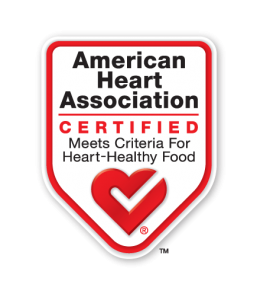Choosing foods that meet Heart-Check certification requirements linked to better diet quality, study finds
By American Heart Association News

People who report eating foods that meet the American Heart Association’s Heart-Check Food Certification Program nutrition requirements are more likely to eat healthier and have fewer heart disease risk factors, according to a recent study.
The study, published in the American Journal of Clinical Nutrition in March, evaluated survey data taken from about 11,000 Americans reporting what they ate in a 24-hour period. It found that those who chose foods that would meet Heart-Check certification requirements typically ate more fiber, whole grains, fruits and vegetables. They also reported eating fewer empty calories from added sugars and less sodium.
“We found that when people reported eating foods that would qualify for the Heart-Check program, their intakes were positively linked to higher quality diets and were less likely to have risk factors for heart disease,” said Alice H. Lichtenstein, D.Sc., the study’s lead author and professor of Nutrition Science and Policy at Tufts University. “This study suggests that front-of-pack labels like the Heart-Check mark that rely on science-based criteria can be useful guides in terms of selecting a high quality diet.”
Heart disease is the leading cause of death in the U.S., and stroke ranks fourth, but healthy eating can significantly reduce the risk for both. Improving diet quality can be a key factor in reducing chronic disease risk, particularly of heart disease. The study found that higher consumption of Heart-Check certifiable foods was also positively associated with a more-favorable profile of several factors related to heart disease risk, including lower body mass index (BMI), waist circumference, diastolic blood pressure, and in men, total and LDL-cholesterol concentrations.
“The American Heart Association encourages a healthy eating pattern for all Americans as the first defense to reducing risk of heart disease and stroke,” said Rachel Johnson, Ph.D., R.D., Professor of Nutrition at the University of Vermont, chair of the association’s Nutrition Committee and one of the authors of the study. “By providing resources and tools like the Heart-Check program, we are making it easier for people to make better food choices. Foods with the American Heart Association Heart-Check mark can guide consumers to better food choices and, in turn, help them build a more healthful dietary pattern.”
The Heart-Check mark, the front-of-package icon of the American Heart Association’s Food Certification Program, has been helping shoppers select healthier foods since 1995. The Heart-Check Mark is a useful tool for consumers constructing a healthier diet. American Heart Association Heart-Check Food Certification program criteria are based on sound science regarding healthy dietary recommendations, food categories, specific product ingredients and nutrient values, and are consistent with relevant government regulatory standards for making coronary heart disease claims. The Heart-Check mark is the health icon most trusted by consumers to identify foods that are consistent with a heart-healthy diet, according to consumer market research.
In 2011, the association announced new Heart-Check certification requirements, giving food companies with products that didn’t meet new criteria two years to reformulate their products or discontinue participation in the program. The new requirements went into effect in January 2014.
Johnson hopes these new requirements, along with the recent study results, will encourage food manufacturers to make more healthy products available to the public – and also encourage people to choose healthier options at the store. Given the existing state of processed foods on the market, the American Heart Association’s Food Certification Program is playing an important role in helping Americans move their diets in a healthier direction.
In addition to looking for the Heart-Check Mark on food products, reading food labels is important. The American Heart Association encourages consumers to educate themselves about the foods they eat, by reading nutrition labels and looking for the Heart-Check Mark on food products.
Heart-Check Food Certification Program nutrition requirements are intended for healthy people over age 2. People with special medical needs should follow the advice of their healthcare professionals. For more information on the Heart-Check Food Certification Program and to find certified foods, visit heartcheckmark.org.




